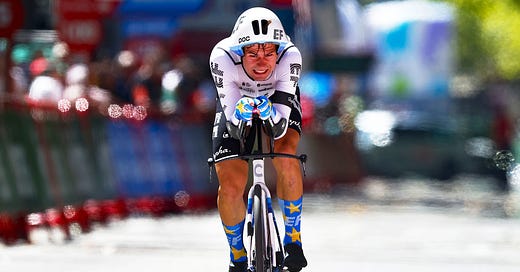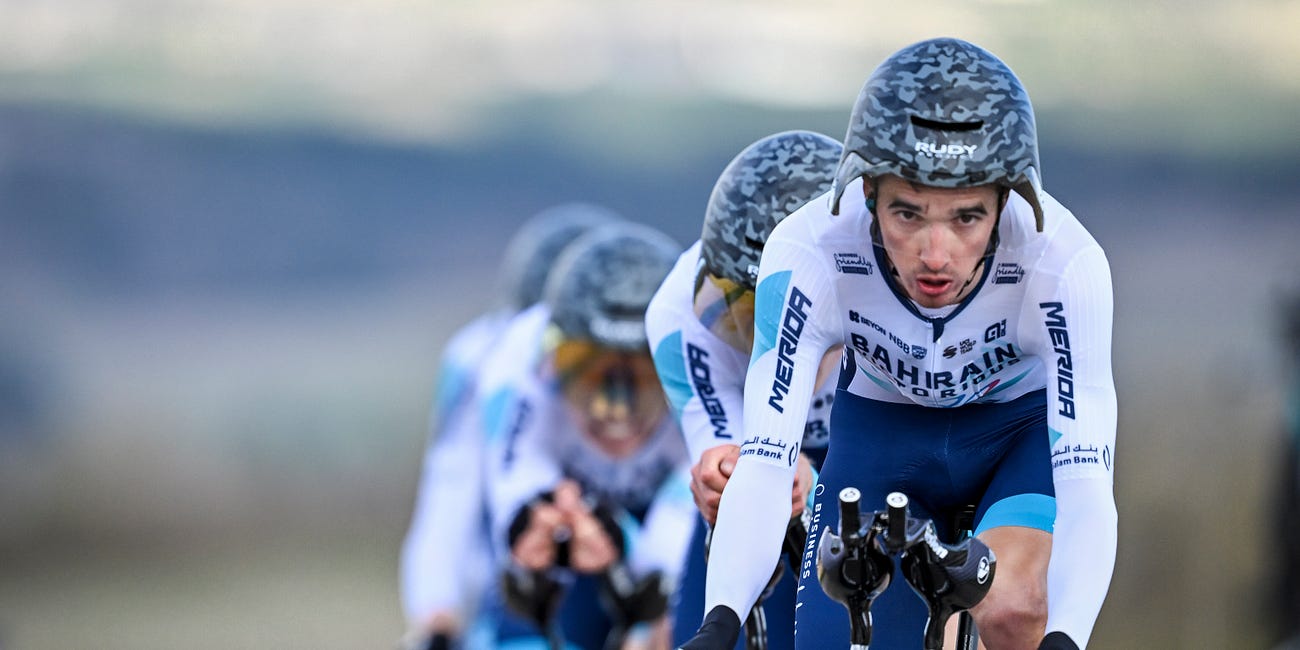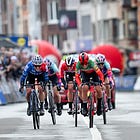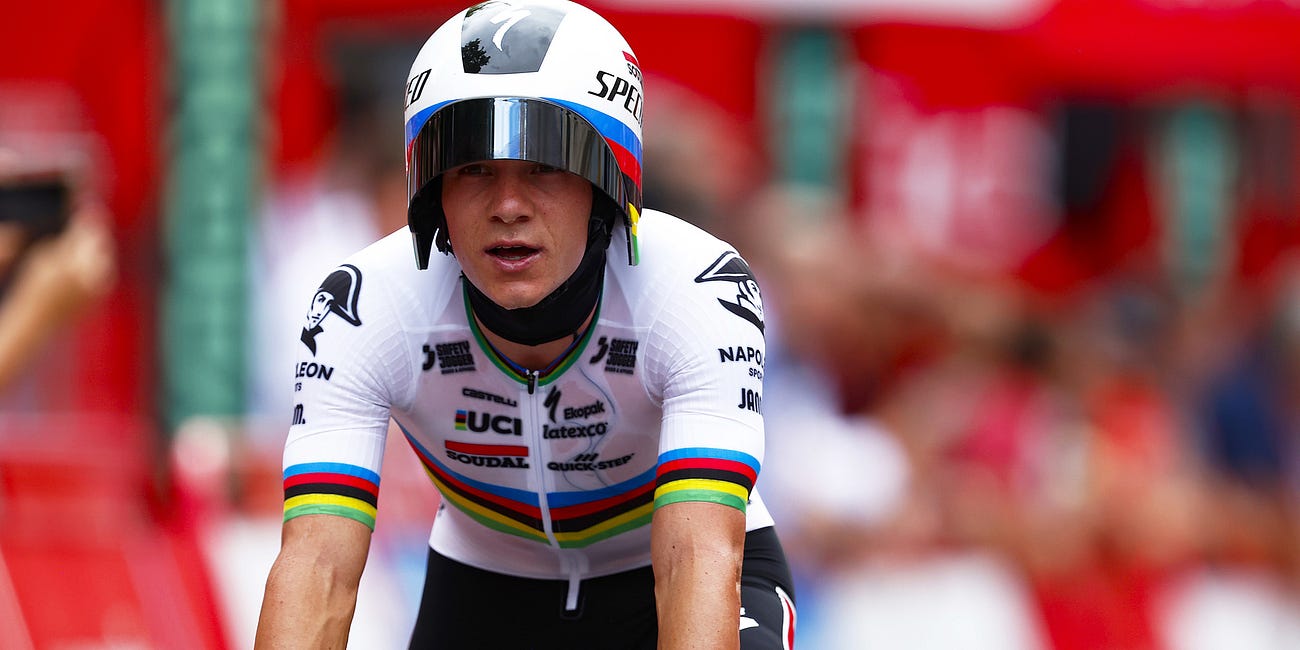I love Olympic cycling. It’s chaotic: Small teams and no race radios make it incredibly difficult to institute team tactics. And even then, national teams sometimes have difficulty getting rival riders to commit to helping their erstwhile teammates.
Cycling is a team sport, but only one person gets a gold medal. It’s one thing for Visma-Lease a Bike to tell Wout van Aert to empty the tank in support of Jonas Vingegaard—Visma-LAB pays him a seven-figure salary and sets him up to win in the classics. Team Belgium doesn’t pay him shit, and they’re going to ask him to help a rival, like Remco Evenepoel, in a race Wout thinks he could win himself? Be serious. Things can get weird in Olympic road racing.
But none of that matters for Saturday. On Saturday, the first proper day of the Olympics, road cycling will distribute half of its medals in the individual time trial for both men and women. The road race is both a test of physical ability and mental agility; the time trial is just about getting from here to there in the shortest time without crashing.
On the plus side, the time trial is where pro racers break out their goofiest-looking equipment.
All the Freaky World Tour Time Trial Helmets, Ranked by How Excited they Make Me About the Future
Note: On account of there being like 20 images in this post, Substack is giving me error messages about it not fitting in your typical email inbox. Not to worry: you can click through and read it on the site or in the app.
The 69 riders1—34 men and 35 women—who’ll take the start in Paris are going to be decked out in their national team kit, but with all of their trade team equipment. That includes helmets and bikes. I don’t imagine this is going to be a glamor TV event for NBC/Peacock. It’s not track or swimming or gymnastics, nor is it one of the hipster Olympic favorites like team handball. But some non-trivial portion of the audience is going to flip on the TV to watch cycling for the first time all year, and find out that everyone’s dressed like a melted Darth Helmet.
Form follows function, and these riders wouldn’t dress like they do if there weren’t an advantage to be gained. For his part, van Aert has experimented with using a two-disc wheel setup. That’s unheard-of in road cycling, because while it’s marginally faster in calm conditions, it’s like putting a giant sail on your wheel in the event of a crosswind. Such are the margins at play here.
The Olympic time trials are restricted to two riders per country, and to fill out the field, the organizers open qualification to countries that would usually have no hope of putting a rider in the Tour de France. Dan Challis wrote about eight of them for Global Peloton here.
But who’s going to contend for the medals?
In 2021, the Olympic time trial course was hilly and undulating, opening up the race to racers who excel in grand tours, and not just against the clock. Not so this time around. The Paris parcours is 32.4 kilometers in length, for both men and women, and the whole thing varies in elevation by just 33 meters. This is the flattest course you’re ever going to see, which means it’s going to be a day for the specialists.
It’s not easy to be a time trial specialist. There are hardly any one-day time trial races, and it’s not even a given that stage races will have a time trial—at least not a time trial that’s flat enough for the biggest, fastest riders in the world. So a rider like two-time world champion Filippo Ganna will train all year for something like five days’ worth of racing.
So they’ll be ready to get after it.
The first of those specialists to watch is Chloé Dygert, the 27-year-old American in her third Olympics. Dygert has won silver and bronze at the Olympics on the track, where she’s also won eight world championships. More relevant to this event, she’s a two-time world time trial champion, and yeah, what the hell, I’ll post the video of her first world championship ride again.
It’s been five years but it still makes the hair on the back of my neck stand up. You will never see a rider fuck everyone’s shit up worse than this, especially in a time trial.
Since then, Dygert has battled one injury after another—first a crash while defending her world championship in Italy in 2020. She overcooked a corner on a wet road, flipped over an Armco barrier, and almost tore her leg off on the way down the hill. Her second world title, last year, was nowhere near as dominant—her margin over Grace Brown was just six seconds—and she’s raced just three days on the road in 2024 after an Achilles injury and a bout of COVID. Between the time trial, the road race, and her two-day team pursuit effort on the track, Dygert is going to double her annual race workload in Paris.
But when she’s 100 percent, nobody can touch her. Nobody can come close. Injuries and all, Dygert is the best American hope for a medal on the road.
Who’ll win gold if Dygert isn’t at the top of her game?
Well, Brown is pretty high on my list of contenders. At 32 years old, she took the biggest race win of her career at Liège-Bastogne-Liège back in April.
More to the point, Brown not only finished second to Dygert at worlds last year, she finished second—by one, uh, second—at the Giro d’Italia time trial three weeks ago. Remember when I said time trials were rare? There have been two all year at the Women’s World Tour level. One was at the Giro, the other at the Tour de Suisse, and that one was an uphill drag that has zero predictive value for the flat Olympic course.
Across all levels of competition, Brown has started 11 individual time trials over the past three seasons. She’s won seven, including three straight Australian national championships. The other three races include three second-place finishes—the Giro and silver medals at the past two world championships—and one fourth place in the last stage of last year’s Tour de France Femmes. She’s out for blood.
The other time trial specialist to watch out for, apart from Dygert, is Ellen van Dijk. She’s 37 years old, and missed all of last season while having a baby, but she’s undefeated in three ITTs this year, and in 2022 she won the world time trial championship—her third—and broke the women’s hour record. At 6-foot, she’s one of the biggest riders in the women’s peloton, but on flat ground that just means she’s going to be able to make use of her incredible power. Because she didn’t race at last year’s world championships—which determines the start order—van Dijk is going to have an early start time, while Brown and Dygert are going to be the last two riders off the ramp. That could be an advantage or not, but with just 21 minutes between van Dijk’s scheduled start time and Dygert’s, isn’t unlikely that we’re going to see any wild variance in weather conditions.
The other contenders for gold in the women’s race are the riders who just win everything: Demi Vollering, who won the Vuelta this year, and the Tour last year2, and that mountain time trial at the Tour de Suisse. She was sixth at worlds last year. Lotte Kopecky is incredibly powerful, and a competitive time trialist, but probably not a medal favorite.
But I’d look out for Elisa Longo Borghini, who won the time trial and the GC at the Giro, and had an absolute monster classics season, including a win at the Tour of Flanders. I’d predict Dygert for gold, Brown for silver and van Dijk for bronze, but if any of those three falters, Longo Borghini is my next rider in line.
The men’s field is filled to overflowing with time trial specialists. Looking at the start schedule, I’d expect Italy’s Alberto Bettiol, who’s fourth off the line out of 34, to be in the hot seat for a while. But while Bettiol’s handy in a short time trial, over this kind of distance he’ll be lucky to end the day in the top 10.
The real favorites start rolling off the line in the last 15 riders: Switzerland’s Stefan Bissegger, the former European champion, starts at 5:02 local time, followed immediately by American Magnus Sheffield, then two riders later by van Aert, who’s won time trials at the Tour de France and come second at the world championship.
We’re at a bit of a changing-of-the-guard moment in terms of the best male time trialists. The parcours at the last Olympics was hilly, plus defending champion Primož Roglič just crashed out of the Tour de France and will not be taking the start. Roglič is one of just eight active male riders with a time trial medal of any color at the Olympics or world championship. One of the others, Victor Campenaerts, is not racing the time trial because of the two-rider-per-country limit.3 Van Aert is a third.
The other five are among the last eight riders scheduled to go off the line: Tobias Foss of Norway, Josh Tarling of Great Britain, Stefan Küng of Switzerland, then Ganna and Evenepoel.
Foss is probably not going to be a serious contender. His world championship win was viewed as a shock; there were eight riders within a minute of him and two others within 10. Including Evenepoel, who literally did a double take when he found out who won.
Evenepoel, the reigning world champion, is a bit of an anomaly. See, Ganna, Küng, Tarling, and van Aert are all 6-foot-3 or taller, and all weigh at least 170 pounds. Evenepoel is 5-foot-7, 134. That’s actually pretty normal for a GC rider, and Evenepoel just finished third at the Tour de France, where he—wait for it—won a time trial stage. But guys that size just tend not to be able to put out the kind of power that wins you a flat time trial like this one.
Evenepoel is the exception. He’s able to tuck himself into a little ball that just doesn’t create much air resistance. If he’s got anything left in the tank after a pretty demanding Tour, he should end up taking a hilarious podium photo with someone twice his size.
Of the big dudes, Ganna is my man to watch. He won a gold medal on the track in Tokyo, and while he didn’t race the Tour de France this year he did win a time trial very much like this one at the Giro d’Italia. Ahead of a field that included Olympic contenders Sheffield, Foss, and Luke Plapp.
Tarling is what you’d get if Ganna were much younger and British. Last year, Tarling won the British and European time trial championships, plus Chrono des Nations4 at age 19. He also finished third behind Evenepoel and Ganna at worlds. At the Critérium du Dauphiné, he finished second in the time trial behind Evenepoel.
Küng and van Aert are also in this mold as time trialists—van Aert climbs better than the other three big guys, which will do him fuck all good on this course, which might be why he’s doing equipment experiments the week before the Olympics. Between the two of them, Küng and van Aert have eight medals in road racing at the Olympics…six silver and two bronze. It extends to road racing; the two perpetual bridesmaids have eight podium finishes at monuments between them but only one win.
I think this is Ganna’s race to lose, followed by Evenepoel, then Küng. Maybe Tarling if Evenepoel is tired after the Tour, and not sharp. I’d love a van Aert win, but he looked off the pace at the Tour de France and I’m not sure he’s in a great spot right now.
This preview is now well north of 2,000 words, so I should stop. But I do want to say before I go that I really, really like the two young Americans in this race: Sheffield and Brandon McNulty.
Magnus Sheffield is the Truth, and He Is Hot On Remco Evenepoel's Heels
This weekend, Remco Evenepoel won his first stage race of the season, the Volta ao Algarve. Even though he was bested on two uphill…oh, my apologies, Lord Helmet, I must’ve made a mistake.
Sheffield has already run Evenepoel close at one time trial this year,5 at the Volta ao Algarve, and I think he’s due for a breakthrough win against the clock if he can just. Stop. Crashing.
McNulty’s undefeated this year in time trials longer than 10 kilometers6, and he finished fourth at worlds last year. He’s having an awesome season, with six wins. But he’s more of a GC rider who’s good in time trials; he’d benefit from having some hills on this course because I think Ganna and company are going to put him on the canvas on flat ground. Also, a very young McNulty was the last man dropped from Richard Carapaz’s winning move at the Tokyo Olympic road race, so he’s got a karmic IOU from the IOC.
A medal for the two young Americans in this event is probably too much to ask for, given the competition. But I expect both to have strong showings, and wouldn’t be shocked if either ends up in the top five.
In short, WOO OLYMPICS! USA! USA! USA! (BAAAAH BAAAH BUH-DAH-DAH-DAH-DAH…)
Nice
Including second place in that race-ending time trial
You can be one of the 10 or so best time trialists in the world and still only be the third-best Belgian. Life is hard in the land of French fries and international bureaucracy.
Which is, like, the only standalone time trial race out there
I’m leaving the big preview so you can see how ludicrous Evenepoel’s time trial helmet looks.
Three wins in total, plus a team time trial win at Paris-Nice










